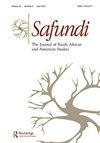Memory in haunted times: a roundtable discussion of Zulu love letter
IF 0.2
Q4 AREA STUDIES
Safundi-The Journal of South African and American Studies
Pub Date : 2020-09-29
DOI:10.1080/17533171.2020.1823735
引用次数: 0
Abstract
ABSTRACT This roundtable is curation of broad-ranging and multidisciplinary reflections on the continuing relevance of Zulu Love Letter, fifteen years after its release. The connecting strand in all the reflections is how the film invites us to ponder on the enduring legacies and the disturbing specters of apartheid, especially in these tumultuous times characterized by all sorts of political, economic, gender, xenophobic and ableist violence. The recurring concern in all the contributions is how to make sense of these specters of apartheid that linger in the post-apartheid landscape. While some of the reflections in the roundtable show how Zulu Love Letter forces us to rethink our assumptions about reconciliation in South Africa, others point to the recalcitrant presence of the past inscribed on individual bodies and in rebellious mournings. Some reflections also touch on the cinematic qualities of the film in order to locate it within the genre of counter cinema, especially on account of its remarkable tendency to disrupt linearity. The copious use of flashbacks – or interludes – in the film helps to foreground the argument about haunting in post-apartheid South Africa. In all, we reflect on the making, reception, public life as well as the revived intellectual interest in the film. We note how, since the calls for fees must fall and decolonization, the film appears to be interpolated in inter-generational reassessments of the gains and losses of the post-apartheid period in South Africa.闹鬼时代的记忆:祖鲁人情书的圆桌讨论
这个圆桌会议是对祖鲁情书持续相关性的广泛和多学科反思的策展,在其发布15年后。所有这些反思的连接线是,这部电影如何邀请我们思考种族隔离的持久遗产和令人不安的幽灵,尤其是在这个以各种政治、经济、性别、仇外心理和残疾暴力为特征的动荡时代。所有贡献中反复出现的关切是如何理解在种族隔离后的环境中挥之不去的种族隔离幽灵。虽然圆桌会议上的一些反思表明,祖鲁情书如何迫使我们重新思考我们对南非和解的假设,但其他人则指出,在个人身上和反叛的哀悼中,过去的顽固存在。一些反思也触及电影的电影品质,以便将其定位在反电影类型中,特别是考虑到它明显的破坏线性的倾向。影片中大量使用的倒叙——或插曲——有助于突出关于后种族隔离时期南非鬼魂的争论。总之,我们反思了电影的制作、接受、公共生活以及对电影重新燃起的知识分子兴趣。我们注意到,由于要求学费必须下降和非殖民化的呼声,这部电影似乎是在对南非后种族隔离时期的得失进行代际重新评估时穿插进来的。
本文章由计算机程序翻译,如有差异,请以英文原文为准。
求助全文
约1分钟内获得全文
求助全文
来源期刊
CiteScore
1.00
自引率
0.00%
发文量
0

 求助内容:
求助内容: 应助结果提醒方式:
应助结果提醒方式:


